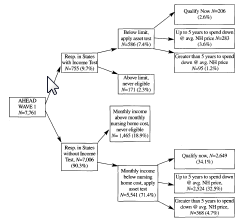A few things always come up when I teach intro to the U.S. Health Care System at Duke. One of them is a student’s dad who knows about the friend of a cousin’s uncle who gave away all their money, moved to a nursing home paid for by Medicaid, while their family toured the world with their riches. Or something.
While I am sure there are persons who engage in purposeful spend down to qualify to Medicaid NH financing, it is useful to remember that this story requires someone who wants to move to a NH. My skepticism lead me to investigate this issue in the first paper I ever did on LTC, published back in 1999 along with Frank Sloan and Edward Norton “Formation of Trusts and Spend Down to Medicaid.” We used the first wave of the Asset and Health Dynamics Among the Oldest Old (AHEAD) database and overlayed the income and wealth information of individuals with their state’s Medicaid spend down rules to determine what proportion of the elderly could benefit from the use of a trust to achieve spend down, as well as the proportion who had any type of trust. Basic findings among the elderly:
- Around 4 in 10 were spent down in the community and eligible for Medicaid financing of NH care.
- Around 2 in 10 could never qualify for Medicaid due to their income being above their state’s Medicaid income test.
- Around 4 in 10 respondents had enough assets that they could have plausibly benefited from purposeful spend down. Of these, only 1 in 10 of them had a trust of any type (respondents were asked about trusts generally, and not in relation to spend down). So, 4% of this sample had a potential spend down motive and a trust of any type, the most common way to accomplish purposeful spend down.
The figure below demonstrates the asset distribution of the population with respect to how long it would take them to spend down given the average price of a NH in their state.
There are many, many more elderly persons who are spent down in the community or who would be eligible for Medicaid financing of a NH within a few months of moving to a NH than there are persons with enough assets to make purposeful spend down even potentially worth it and who have a trust. I have always found this general story to be quite implausible, since it requires someone to desire to enter a NH. However, that doesn’t keep it from coming up every time I teach intro to the U.S. health care system. We should stop people from inappropriately using Medicaid, but doing so is no solution to our LTC problems. The study is over 10 years old, but I haven’t seen any evidence to cause me to change my view on this. If you have some, send it to me.
******
Donald H. Taylor, Jr, Frank A. Sloan, Edward C. North. Formation of Trusts and Spend Down to Medicaid. J Gerontol B Psychol Sci Soc Sci (1999) 54B (4): S194-S201.


